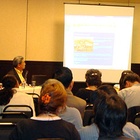In this important and interesting meeting held in São Paulo, jointly with the 14th Pan-American Nikkei Convention, the debates started with a superb and stimulating speech of Prof. Kotaro Horisaka. In the final session, coordinated by Prof. Masato Ninomiya, I had the opportunity to make some small remarks.
It was suggested by the convention leaders that the discussion were concentrated in the current problems and future perspectives of the Nikkei communities. The presentation of the participants of abroad showed that, despite some similar problems, there is a large diversity of situations faced. This shows that the Nikkei is not a simple extension of the Japanese abroad. They are conditioned by experiences in the countries that they live, getting in touch with other ethnic groups and cultures, acquiring their own identities, with many of them having non-Japanese nationalities.
The diversity of situations is not only a result of the dimensions of the involved countries or ethnic and cultural environment, but also of the Nikkei community size in each country. In Brazil, the contrast is noticeable when compared big and small cities, urban and rural areas, neighborhoods with different concentrations of Nikkei, as well as their whole surroundings.
Japan, as it is well known, presents an ethnically homogeneous population, that has lived for a long time in islands and consolidated its own culture, which is in dynamic evolution today. An intensive exchange with abroad Nikkei communities has a high potential because they lived in contact with other ethnic groups and cultures, naturally and hopefully, integrated in the main society. This exchange can contribute with a healthy renovation of Japan, as a return to the Japanese that ask for internationalization and globalization. The Nikkei’s communities abroad will benefit with new cultural contributions from a contemporary and developed Japan, well known by its economic and technological capacity.
The Brazilian Nikkei population is estimated around one million and five hundred thousand. Part of them, about three hundred thousand, are living and working in Japan. Sussumu Miyao from the Nippo-Brazilian Center of Studies estimated that only sixty thousands of Nikkei have active participation on entities linked to the Nikkei community. Where is the remaining one million of Nikkei? In my opinion they are living integrated in Brazilian society, in a natural process, contributing with their cultural and ethnic assets, without deep links with the Nikkei community. Therefore, the exchange must be with all Brazilians, because a considerable part of them are interested in aspects of Japanese culture that are well appreciated.
Among the problems that must be solved before achieve a more positive exchange it is the one related with the Brazilian Nikkei’s sons who were born in Japan. Brazil and some other countries, like United States, use the criteria of “jus solis” for the definition of nationality. Japan uses the “jus sanguineo”, that is, those who have Japanese blood are considered Nikkei, when they were born abroad. But, the Nikkei’s’ descendents who were born in Japan are considered “homeland less”, that means, they are displaced people, they have no nationality. They face the risk to become “second class citizens”, as many people supported by UN Committee of Refugees, especially after the wars.
The improvement of Japanese laws to accommodate this situation is urgent, facilitating the option for the hoped nationality. Because Japanese population is lessening, the country is obliged to accept increasing presence of foreign workers, especially for simple jobs. The preference must be given to Japanese descendants, as it has been happening with temporary work visas. Those visas are becoming, in a way, permanent, because of the possibility of constant renewal.
Japan has received skilled human resource, mixed from the point of view of ethnics, with different education and cultural assets. And this mixture, as proved scientifically, generates a creative “cross fertilization”. In the future, when they retire, the majority will return to their homeland, because of the prohibitive cost of living for elder people in Japan. As a result, the cost for the Japanese taxpayers is low, although there are costs for the adaptation of foreigners in Japan. The net benefit to Japan is very high.
A political decision in this direction would be an active measure with a clear message that Japanese really wants a real exchange with the Nikkei community abroad, which, in fact, can offer enormous contributions to Japan. The real exchange must be a reciprocal one, and the Nikkei communities must avoid the financial dependency of only Japanese donations.
Japanese immigration succeeded in many countries; therefore we must show that we also became capable to contribute to a reciprocal exchange with Japan, only asking for eventual and complementary donations, which should contribute to common benefits. This is true for scholarships that contemplate Nikkei to study in Japan, and Japanese in abroad, so they can experiment living in foreign countries. Or in the joint development of new technologies, for instance, ethanol or other method of clean energy supply, as it is already going on.
The Nikkei communities abroad conquered precious assets and can be proud of this, because it was made with blood, sweat and tears, coping what said Winston Churchill, and became very important to a profitable reciprocal exchange with Japan.
São Paulo, July 19, 2007
© 2007 Paulo Yokota



